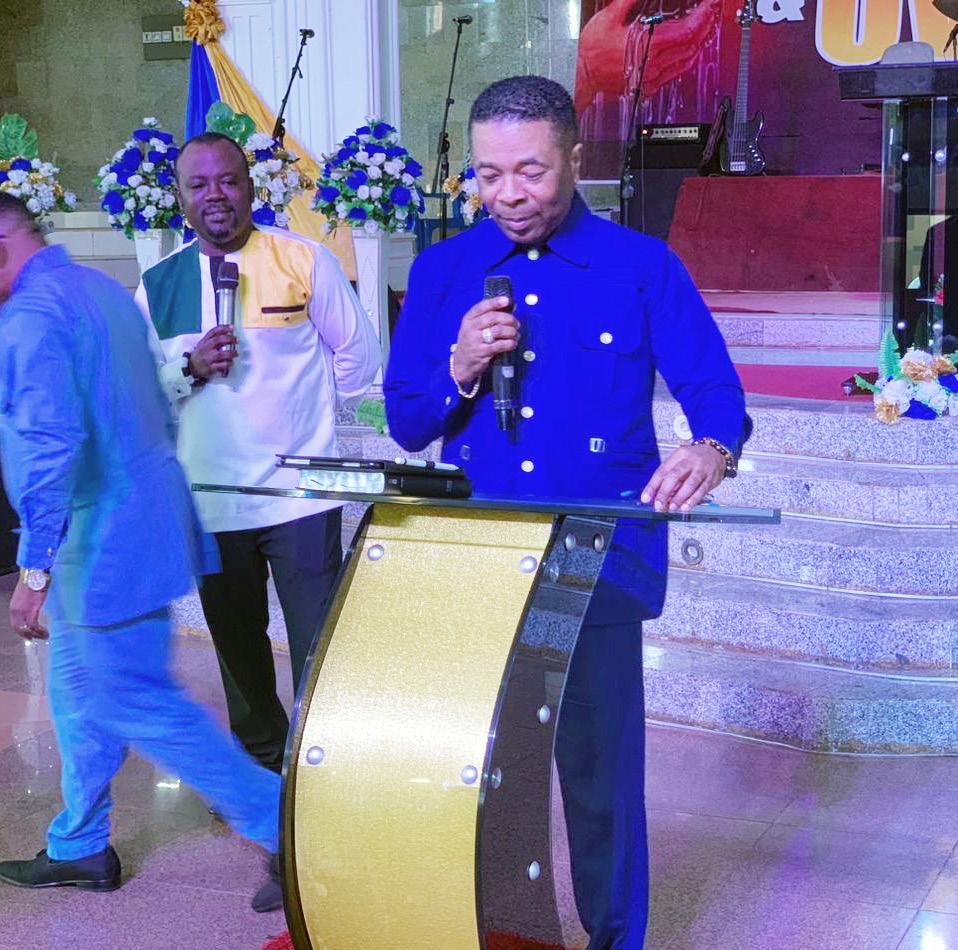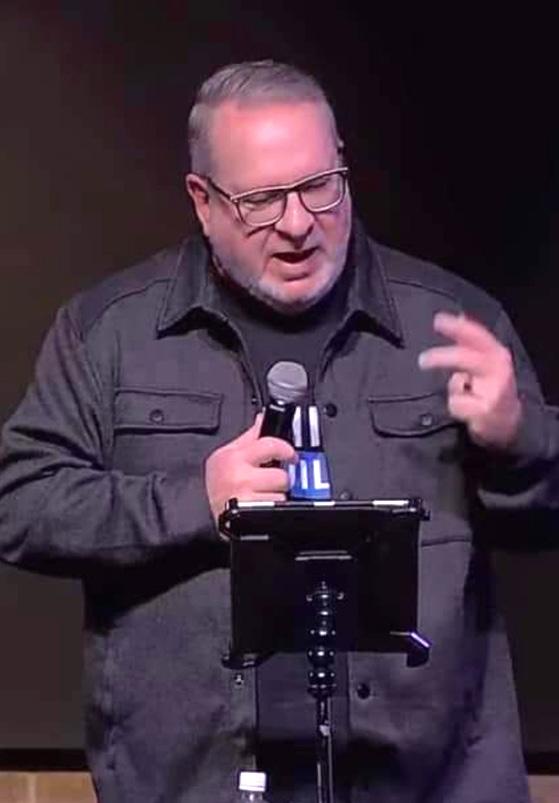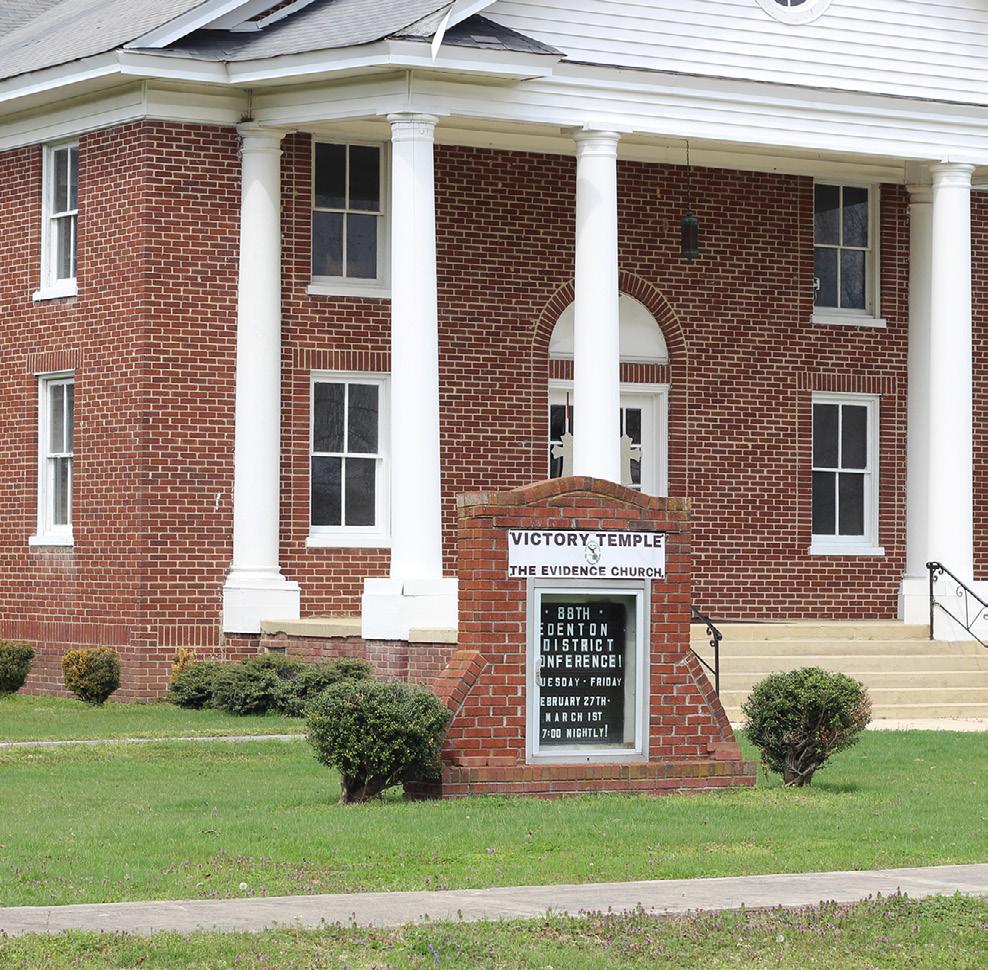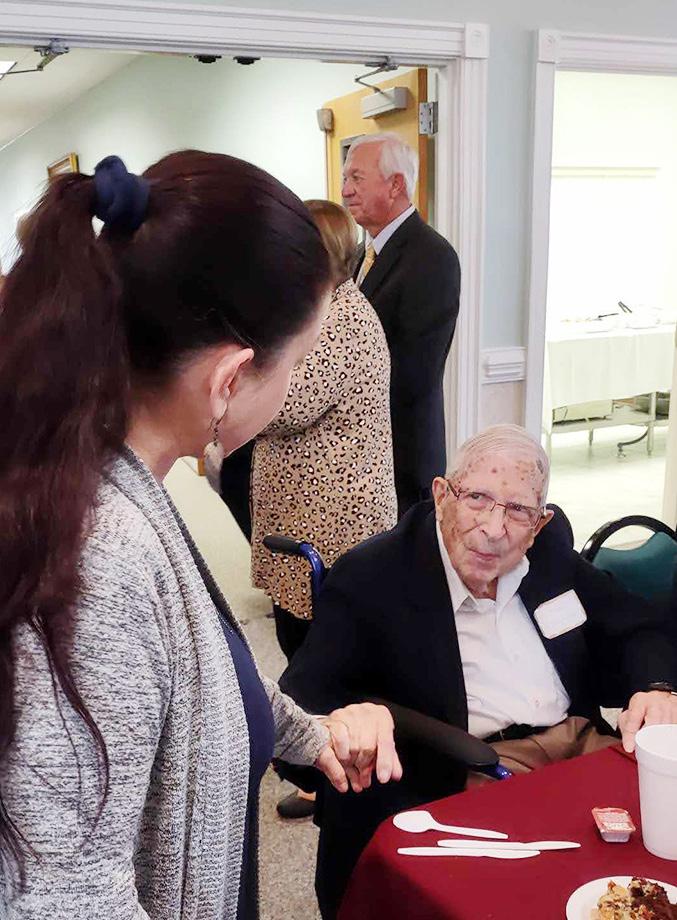

EASTERN LIVING
AtHome...
THE PULPIT


































Colon Cancer.
Early detection from screenings may save your life.

Colon cancer is very prominent and very deadly in North Carolina. But you are not defenseless. Screenings may prevent twothirds of all colon cancer deaths.
Beginning in your forties, you need to get screened. Family history or IBD increases your risk, and so do lifestyle factors including diet, exercise, alcohol, and smoking.
Scheduling a colonoscopy screening gives you an advantage because it helps doctors identify potential problems earlier, when they are more treatable.
Colonoscopy screenings are:
• Recommended beginning at age 45 or sooner
• An essential part of your regular health care
• Offered in many convenient locations
• Covered by most insurance plans
Take a risk assessment or find location and scheduling information at ECUHealth.org/Reminder







Publisher
Kyle Stephens kstephens@apgenc.com
Editor Thadd White twhite@apgenc.com
Copy Editors Eugene Tinklepaugh etinklepaugh@rmtelegram.com
Ashley Parker bertienews@ncweeklies.com
Layout & Design
Thadd White twhite@apgenc.com
Michelle Leicester bertienews@ncweeklies.com
Advertising Executives Lou Ann Van Landingham lvanlandingham@apgenc.com
Brandice Hoggard bhoggard@apgenc.com
Kelly Ayscue kayscue@rmtelegram.com
Photo Editor
Jim Green jgreen@rmtelegram.com
Staff
John Foley jfoley@apgenc.com
Vernon Fueston vueston@apgen.com
Editorial Contributors
Sandy Carawan
Sarah Davis
Sylvia Hughes
Kelly Grady
Deborah Griffin
Lewis Hoggard
Gene Motley
Eastern North Carolina
109
Windsor, NC 27983 252-794-3185 twhite@apgenc.com
Nash County Evangelist

Called to preach
RoyceWilliams
Story by Deborah GrifÏn u Photos by Deborah GrifÏn & Contributed

Itinerant evangelist Royce Williams is at home in the pulpit - wherever that happens to be - the cold Siberian wilderness, the Jamaican tropics, a tiny farming community or a metropolitan megachurch.
“I am most at home being in different pulpits,” said Williams, a native of Rocky Mount where he lives with his wife, Wanda.
He is committed to ministering to “any church, of any size, in any location.”
Since beginning his ministry around 33 years ago, he said, “The Lord has opened doors for me to preach in 21 states and seven foreign countries.”
As a full-time evangelist, Williams preaches revivals, serves as an interim pastor, leads Bible studies and even sings on occasion.
When he was 16 years old, Williams surrendered his life to ministry during summer camp in the North Carolina Uwharrie Mountains at Camp Caraway (now known as Caraway Conference Center and Camp).
“I had given my life to Christ when I was nine,” Williams said. “I was already under conviction when I went to camp. Then, down by the lakeside they gave an invitation. I felt like, ‘it’s now or never.’”
Though he felt called, he wasn’t sure in what capacity.
“I loved to sing and play the guitar,” he said.
So, upon high school graduation, he enrolled at Campbell College (now Campbell University) in 1973 in their music program. But he soon realized his calling went beyond simply a music ministry.
He graduated in 1977 with a bachelor’s degree in special studies and church ministries, which led him to doing music and education at East Lumberton Baptist Church, then later at Southside Baptist in Wilmington.
Although he loved it, deep down he felt the tug of the Lord calling him preach.
“I kept pushing that to the back of my mind,” he said. “I loved music, directing the choir and leading the congregation in music. I told the Lord, ‘Why don’t you just leave me alone and let me get comfortable in this ministry?’”
Then, in April of 1987, during a revival service at Southside, he felt jolted into taking steps to become a preacher.
“The revival preacher gave his personal testimony. He said he was a full-time minister of music - and God was calling him to preach,” he added with a chuckle. “By the time he finished, I knew the Lord was telling me, ‘This is your last chance.’
“When I got up to lead the music at the end of the service, the organist started playing ‘Just as I Am’ - a song I had sung since I was nine years old - and I couldn’t find my note.”
Williams relented. “I said, ‘Ok, Lord.’”
He walked down from the podium and went his pastor, standing at the front of the church.
“I was supposed to be leading the invitation, but I came forward to the invitation,” Williams continued.
“I told him, ‘God is calling me to preach.’ His pastor said he already knew. “He asked me, ‘What has taken you so long?’”
Three months later, Williams was enrolled at MidAmerica Baptist Theological Seminary in Memphis, TN.
While in seminary, he guest-pastored a small church in eastern Arkansas, just across the Mississippi River, about 40 miles from the seminary.
“What a great experience that was. I learned more from them than they learned from me. I still have a close relationship with that church and go back for revivals quite often,” he said.
He also began preaching revivals at neighboring churches in Arkansas and Tennessee, which confirmed where he felt most at home - on the road.
Williams decided to finish his last year of seminary at Southeastern Baptist Theological Seminary in Wake Forest, graduating in December of 1991.
He then formed his ministry, Missions Evangelism Ministries.
“I’ve been traveling ever since,” he added.
In addition to his traveling ministry, he spent seven years as pastor at Oak Grove Baptist Church in Roper.
“I started out filling in as pastor, then became their interim. Then they called me as pastor,” he said. “The only reason I retired from there was I felt God had called


me to evangelism. I was getting too many invitations from too far away to stay on as pastor.”
Williams also began doing mission work with International Church Planters in the early 1990s, which included trips to Russia (including Siberia) and Ukraine.
“We started 16 churches altogether. As far as I know, 13 are still in existence,” he added.
In 1997, Williams suffered a stroke and lost his ability to speak. He felt his ministry had come to a sudden halt.
From the back of an ambulance, he prayed, “Lord, a preacher and a singer who can’t even talk isn’t worth much. But if you restore my speech and vocal ability, I will sing and preach for you until the day I die.”
Three days later, he was able to speak again.
“That experience led me to decide to stay on the continent. If I needed physical or medical help, I’d be able to get it,” he said.
But in 2012, he was invited to do mission work in Jamaica by fellow evangelist Jim Rice.
“He told me, ‘God can take care of you in Jamaica just like he can in the States.’ Deep down, I knew that,” Williams said.
He has been traveling to Montego Bay every year since (except two years during COVID restrictions).
Throughout his ministry in America, he has watched the number of revivals dwindle each year.
“Churches are not holding revivals like they used to. Every Baptist church used to have a spring revival and a fall revival,” he lamented.
At his busiest, Williams would preach up to 40 revivals in a year. Now, that number is more like 15 a year.

He currently is interim pastor at Cedar Branch Baptist Church in Jamesville, a 122-mile round-trip drive from his home in Rocky Mount.
He has been at the pastor-less country church in Martin County for more than two-and-a-half yearsthe longest he has held an interim position.
“My agreement with them is that I am with them every week that I can be,” he added.
As Cedar Branch continues their search for a full-time pastor, they understand Williams’ primary call is to evangelize.
Williams’ wife also understands that call and has stood by him through the years of traveling, preaching and singing.
“In the beginning, it was hard for her,” he admitted. “But she has come to terms with it.
“We decided early on she would stay at home - although she goes with me occasionally,” he added.
Their home church is Englewood Baptist in Rocky Mount, where she is a member of a Sunday School class and sings in the choir.
He has served at Englewood parttime as staff evangelist since 2015.
“That means I basically serve one week out of seven as pastor on call,” he added. “That has been good.”
Although he feels compelled to be on the road, he looks forward to the return.
“It is always good to get back home,” Williams said. “We have four kids and 15 grandchildren between the ages of 25 and five. Thirteen of them live within 20 miles of us. Four live right next door. God has really blessed,” he added.
Williams has an online ministry page where people can request to get on his calendar, as well as donate to his ministry.
“I use those mission funds to go overseas. I also set aside funds every year to go to one church that cannot afford to pay someone to come for revival,” he continued.
Williams can be found at Missions Evangelism Ministries https://www. roycewilliams.com/
Williams is endorsed by the North American Mission Board (NAMB) in Alpharetta, GA.










A servant heart TheRev.Dr.DerrickWilkins
Story by John Foley u Photos Contributed

Heading West on Bear Grass Road just off of U.S. 17 after passing the fifth hole of Roanoke Country Club, the Back Swamp Church of Christ, Disciples of Christ, appears on the right.
The picture postcard church sits back off the road in the slightest valley rolling flatland roads offer. Vibrant green fescue, manicured as though it were a neighboring fairway, serves as the canvas for the architecturally pleasing red brick house of worship. The church has been a pillar in the Martin County community for over a century and has stood on its Back Swamp property since 1908.
However, it’s what happens within the church and the community outreach Back Swamp’s members perform that shines brightly on the Back Swamp congregation and it’s Elder, the Rev. Dr. Derrick Wilkins.
Dr. Wilkins, an Eastern North Carolina native, born in Roper, has led the Back Swamp membership for 28 years and in that time has achieved tremendous heights.
“My ministry journey began on May 16, 1993, when I preached my initial sermon at Salem Baptist Church, now Salem Bible Church, in Atlanta, Georgia. I relocated to North Carolina in August 1993 to accept a position at Elizabeth City State University,” said Dr. Wilkins. “I was ordained in the Washington and Norfolk District Assembly of the Church of Christ, Disciples of Christ in October 1994. I served as an associate minister at St. John Church of Christ, Disciples of Christ, in Washington until I was called to serve as pastor at Back Swamp Church of Christ.”
Wilkins is also the proud, but humble recipient of the The Order of The Long Leaf Pine Award.
Back Swamp’s roots run deep in Williamston and the Martin County Community, dating back to 1885 when a small group started a mission known as Disciples of
Christ. The congregation met at a location on Washington Street near the Atlantic Coastline Railroad crossing in Williamston.
Eventually, they moved to the Tyner’s Town community and began meeting in a one-room house on Ben and Pat Bigg’s property, explained Wilkins.
Early on the congregation faced challenges. The first pastor was elected from the Free Union Community in Jamesville, but died suddenly leaving the 17-member congregation without a pastor.
After electing Elder Josh J. Ward pastor in 1906, church leaders decided a larger church was needed, purchased land from Mack Riddick near Back Swamp, and decided to name the church after it.
Wilkins became the sixth Elder to lead the Back Swamp congregation in 1996 and has realized many accomplishments throughout his tenure.
The church’s tagline is ‘Impacting the community for Christ through education, evangelism and outreach.’ Dr. Wilkins and the Back Swamp members have developed numerous programs supporting the Williamston Community, living up to the church’s motto.
Back Swamp’s food pantry recently began operation after a COVID shut down and distributes food on the second and fourth Thursday of the month. The Community Soup Day, held at Williamston’s Main Street Haven Park, is an overwhelming, anticipated event. Recently, Back Swamp members took to Bear Grass Road cleaning up debris along the highway to maintain that picture postcard image throughout the neighborhood.
“We have a nursing home ministry where we render services at one of the local facilities several times a year,” Dr. Wilkins said. “We provide gifts to children in foster care through the Martin County Department of Social Services. We also host holiday concerts and educational events such as health seminars, financial literacy and end of life planning.
“We have welcoming and engaging worship services each Sunday,” added Dr. Wilkins.
Historically, churches of all denominations have been the foundation of communities throughout the country; however, polls show church membership across those denominations has fallen below 50 percent of the U.S. population for the first time since polling began, presenting challenges for churches and the communities they serve.
“There are great opportunities for churches to address community issues. The need is tremendous. As we plan programs, our church relations team is responsible for 16


maintaining our Facebook page and marketing our events,” said Dr. Wilkins. “We have a mid-size congregation. We have maintained membership over the recent years.
“We are beginning to see postpandemic growth in membership along with an increase in visitors. In addition to those attending each Sunday, we have gained additional members who live out of state by way of our conference line,” he continued.
Wilkins’ methodology for attracting new members is to be Christ-centric, relevant and welcoming.
“It is necessary to be seen in the community in ways that are impacting lives. We encourage our members to invite people to our events and services,” Dr. Wilkins insists. “We also have an evangelism team that takes part in attracting new members.”
Dr. Wilkins walks the talk of Jesus and urges Back Swamp members to do the same.
“My goal is to reach the masses with the clear message of the Gospel of Jesus Christ. The message of Grace is not just a spoken message, but most importantly, it is a lived message. I emphasize to our members that we have a better chance of attracting people when they see us living the scriptures rather than quoting scriptures,” noted Dr. Wilkins.
The Elder faces the challenge of a weekly sermon as a partnership.
“The challenge of coming up with a weekly topic is keeping my mind and spirit clear to hear from God amid the noisiness of life — personal, environmental, political, etc. The best way for me to remain relevant in preaching is to allow the Holy Spirit to inspire my messages,” Dr. Wilkins said.
He is also concerned about the

poverty in Martin county and how to alleviate it.
“Jesus was concerned about the well-being of the poor and marginalized people, and so am I,” explained Dr. Wilkins. “We deal with poverty by educating our members, encouraging them to be involved in the political process where policies are being developed that will impact the poor, and enlisting their time, talent and treasure to address

poverty in our community.”
“We are striving to ensure the beauty of our members, through their kindness and service to humanity, will surpass the beauty of the building,” Dr. Wilkins humbly said.
Back Swamp Church of Christ is located on 1414 Bear Grass Rd. just outside Williamston.
John Foley is a Sta Writer for The Enterprise, the Bertie Ledger-Advance and Eastern North Carolina Living.




















Chowan County Priest

The right path FatherJairoModonado-Pacheco
Story & Photos by Vernon Fuestion

"God is in charge. My plans are not God’s plans. He leads you. I was thinking one thing, but God had different ideas. But God’s plans are beautiful,” says Father Jairo Modonado-Pacheco.
Pacheco has some experience with that. He has had a life plan since he was 11 years old, growing up in Abrego, Columbia. Sitting in his parish office at St. Ann’s Catholic Church in Edenton, he explains how he made the decision to become a priest.
“I had the fortune to grow up in a faithful, nourishing family. I had a beautiful childhood, and faith was also very much a part of it. They nurtured us with the gift of faith,” he said.
He says that sound’s idyllic, but a near-perfect family comes with its pressures. Young Jairo would never do anything to disappoint his parents.
His mother and father both came from large families. His father, Daniel, had 16 siblings, and his mother, Roqvelina, had 14. Jairo had three. His grandparents lived in the country. His grandfather went to mass every Sunday, sometimes walking 45 minutes to make the service. One of his uncles was a priest, a particular role model.
More than anything else, Father Jairo says he never wanted to disappoint his family.
Father Jairo says he remembers the day the halfformed idea of becoming a priest like his uncle became a plan. That day he came home early after his fifthgrade classes. His mother made him lunch and, to his annoyance, started to talk.
Impatiently he half-listened, preoccupied with lunch until she posed a question to him. She asked him what he wanted to be when he grew up. He blurted out that he wanted to become a priest, but hardly for the right reasons.
“I said that because of something my mom used to say. She said parents will have to give an account for their children when they grow up,” Fr. Jairo said.
That terrified him. She always said that a parent’s vocation was to raise children in the faith, so a parent can expect to answer for that when he faces God.
He recalled, “I was terrified of that. I didn’t want to give an account for anybody but myself. So I think, ‘My uncle is a priest. He’s not married, and he won’t have children.’ So I said to my mother, ‘I want to be a priest.’ She paused and said, “That’s a beautiful vocation, a beautiful path forward, but remember, if you become a priest, you will be the father of many.’ She left me no ground to stand on.”
But that blurted aspiration rang true in his heart, and Jairo kept the plan there until his school days were coming to a close. His uncle came from an order of parish priests, so that had always been his model of what the priesthood would entail. Then, he became acquainted with the Augustinian Order, a group of monks who had a monastery in Bogota.
The idea of living in a monastery with other like-minded priests appealed to him even more than pastoring a congregation terrified him. So, he considered joining them. Once he graduated from high school, his idea became a plan.
But his father hated the notion. His family wanted him to stay near Agrego, not 420 miles away in Bogota. So Jairo decided to break one of his most sacred values; he would disappoint his father and run away to Bogota.
He left home after telling his father a lie about visiting friends for the evening, then caught a bus. The next morning, he called home from the city. Words were exchanged, but he entered the monastery anyway, commencing what would be years of study that were supposed to prepare him for ordination.
After five years at the monastery and a reconciliation with his father, Jairo was facing a spiritual crisis. He was doubting his calling to the monastic life. He asked for some time off to reconsider.
Arrangements were made for him to take some time serving as an assistant to a parish priest. The experience opened his eyes to the rewards of service outside the order. After a year, still unordained, Jairo decided to study English.
In 2013, barely bilingual and unable to carry on a real conversation in English, he immigrated to the United States for more immersive language training.
In 2020, Jairo was finally ready for ordination, but that

was the year COVID-19 struck, shutting off travel from Columbia to the United States.
Once again, he faced a dilemma. He accepted the ordination he’d spent 13 years preparing for, but he would have to do it without letting his parents witness the moment. That was one of their fondest wishes.
After a tearful discussion with his parents, he accepted the calling with their blessing. He was ordained in 2020. In 2022, Father Jairo ModonadoPacheco came full circle.
He accepted a call as a bilingual parish priest in Edenton. He would become a father of many. After a year of service as St. Ann’s administrator, a probationary assignment to see if parish life was his best calling, Father Jairo was installed as the pastor of St. Ann’s in December of last year.
St. Anne’s Catholic Church, founded in 1856, is named for Ann, the mother of Mary who was the mother of Christ. Father Jairo does not lose sight of the church’s connection to a grandmother and mother of Christ. He often thinks about the power of family and the awesome responsibility that comes with the calling to grow and nurture souls.
Being the father of many no longer scares him.
Vernon Fueston is a Sta Writer for the Chowan Herald, Perquimans Weekly and Eastern North Carolina Living.


































GKindredatHomeisnow CenterWellHomeHealth
At CenterWell™ HomeHealth,youcan expectthesame personalized,in-home carededicatedtohelpingyou maintainyour independence. Fromourheartstoyourhome, we’regratefultobewalkingalongsideyou towardsyourbesthealth.
Formoreinformation:
Call252-946-7145
VisitCenterWellHomeHealth.com


1. Wild Bear Tours
2. Runwiththe Bears5K
3. Bear Necessities Paddle
4. KayakRental
5. Rowing Race
6. Helicopter Rides
7. PontoonBoat Rides
8. LazyRiver Tubing
9. Bear TrainRides

10. “CanYou OutRun aBear?” Race
11. Black Bear Theater
12. PresentationbyState Bear Biologist
13.Wildlife Photography Presentation
14. Papa Bear CarShow
15.
16. Over100Vendors
17.
18.Harbor
19. HotAir Balloon Rides
20.
21.10thAnniversaryBirthdayBash
22. Kid’sZone
23. BlackBearPuppet
24. SharkToothDig

25.Face Painting& Balloon Twisting Artists
26. WaterSlides
27.ChainsawCarving
28. SkydivingBears
29. StrollingBears Meet &Greet
30. Golden KnightsArmySkydiving Team
31. Bear Drop (300 parachutingplushbears)
32. Native American Pow Wow
33. NCBlack BearFestival Bass Tournament
34.Live Music
35. EmberFireArtist
36. Photography &FineArtsContest
37. Make-Your-Own StuffedBear
38.Flight Formation Team PyrotechnicFlyover
39. Reflectionson theRoanoke FireworksShow
40. Neon NightsGlowParty AfterFireworks
Explore Williamston

OpenMondaythruFriday7amto5:30pm


Locallyowned &operated Edward, Toby &GregCasper







Hertford County Senior Pastor

More still to do TheRev.Dr.WallacePhillips
Story by Gene Motley u Photos Contributed

It was a calling he answered over three decades ago.
That’s how Senior Pastor and founder of Carpenter’s Shop International Church, the Rev. Dr. Wallace Phillips, describes the road he took to begin to fulfill a ministerial vision.
From a small church in Northampton County to its current location in Ahoskie, Carpenter’s Shop, or CSIC, describes itself in its own words as ‘a multi-cultural, multiethnic, multi-generational body of believers whose vision is to love all people, win them to Christ, build them in discipleship, and send them out in the world to fulfill their divine destiny.’
This is a vital part of what Phillips describes as the church’s trademark.
“Ahoskie falls right in the middle of this RoanokeChowan area of Gates, Bertie, Northampton and Hertford (counties), and here we are in the hub,” Phillips noted sitting in a small office at the church located on Catherine Creek Road.
Phillips feels his congregation mirrors the regional community at large of whites, African Americans, Native Americans, Hispanics, young people and kids.
“Psalms 133 (KJV: Behold how good and pleasant it is when brethren dwell together in unity.) is my favorite scripture,” he stated. “This is our life; we worship together. I look at my congregation each week and say, ‘Wow! What a miracle.’”
His roots began in nearby Perquimans County, coming up as a Southern Baptist before he married and accepted his wife’s worship, which was with the Assemblies of God. He says he wants CSIC to represent peoples of all Christian faith.
“This Church is made up of Catholics, Lutherans, Presbyterians, Pentecostals, Baptists, Methodists, a whole
hodgepodge of diverse Christian influence in this house,” Phillips remarked. “But that’s not what we major in, we major in the love of God through Jesus Christ. That’s what forms our motto of ‘Love, Win, Build and Send’.”
Phillips is proud of the young people CSIC has attracted, and they offer a variety of ministries to both engage and support them.
“Younger people are really looking for something (celebratory) like that,” he said with a wry smile. “When you get a platform full of young people who are excited about worship of God then old people are happy. They love to see the reality that young people are engaged in the ministry here; one of them feeds the other.”
Younger worshipers also bring with them the new technology, and it’s not a fad. Pastors continually use these methods to intentionally consider access, inclusivity and outreach – much of it born out of reaction from the COVID pandemic – to shape the present and future life of their churches.
“I think we’re dealing with a culture of young people today who really want the authentic and the ‘real,” he said.”The world is crowded with so many choices and for us to be as successful as we are it’s young people who’re doing the work.”
Gone now are the days of the traditional Bible and hymnal that we always conveniently located in the back of the pew.
“Everything is on (TV) screens for people to see so they can sing along, and we sometimes have re-mixes and upgraded versions of hymns,” Phillips explained. “We want to be fresh and relevant. You can look around Ahoskie and see the influence of this type of worship with new lights, TV’s and sound systems. I think Carpenter’s Shop really has led the way to introduce the churches of this region to a new way of worship.”
Now in its 32nd year of existence, what began as Carpenter’s Shop Church now with so many ‘nations’ represented Phillips’ expansion added the ‘International’ to the name. With the new technology CSIC has truly now developed a world reach.
“There are so many nations that are represented right here in this church,” Phillips observed. “Our ministry is on television in 182 countries. We broadcast over cable and satellite TV, Apple TV, Roku, every platform that’s out there that can receive it. We’ve been covered by two major television networks; we use stations that want to seek us out.”
One thing members and anyone seeking to bond with 30


CSIC need not fear is the coming –for now – of artificial intelligence.
“We use some, but not a lot,” he disclosed. “A-I takes the creativity out of things and the human content so we just use it for the simple things that would never show up.”
Lest an observer deem CSIC as just a church with a youth explosion, Phillips says his senior worshipers are just as equally involved.
“We do have a senior’s ministry and on our Sunday morning worship team there’s an older lady and she also plays keyboard on Wednesday night for worship,” he described. “We’re not going to forsake them, but include them in everything we do. Seniors and younger people are greeters at the door, both groups do teaching and prayer, intercession, and all kinds of things. So both (young and old) are included, it’s not either/or.”
Finally, Phillips wants to lay to rest any notion of departing CSIC before he completes his mission, though he feels it will be the will of a higher authority.
“I believe that we’ve really only scratched the surface of what God really wants us to do here in this town,” he confessed. “I think he wants us to enlarge, to make it more effective and plant more churches.
:We want to multiply and see Carpenter’s Shop Churches in locations in other areas,” he added. “I’m more excited about Carpenter’s Shop than I’ve ever been in my life. I’m going to stay here for as long as I believe my time here is productive; but I certainly don’t want to get in the way of what God wants to do.”
Gene Motley is a retired Sports Editor and Sports Director and a regular contributor to Eastern North Carolina Living.











North

BELHAVEN
770
770

BELHAVEN








Beaufort County Pastor

Divine blessing TheRev.DannyRobertson
Story by Kelly Grady u Photos by Kelly Grady & Contributed

"Ihave a very vivid memory, a ‘Kodak moment,’ if you will of being around 4-5 years old. It was a rainy day and I was sitting in the front doorway coloring a page in a Bible coloring book of Samson breaking the pillars. I remember thinking to myself, ‘I never want to be a preacher, it’s too hard for their kids.”
Danny Robertson was raised in a Christian home in Plymouth. He attended school, played sports and had the intention of attending law school or becoming a physical education teacher/ coach.
Danny attended both the University of North Carolina and then East Carolina University, earning a Masters Degree in counseling and then earning his Ph.D. at the University of Tennessee.
During his college years, he continued to love and study the Bible incorporating his knowledge into his work as a guidance counselor, youth minister, coach, college professor, campus minister and psychologist.
He met his wife, Angela, while at a Christian Service Camp at the end of the road from where their church is now located. She also shared his love of the Word of God. They had three children and currently have six grandchildren with another one due soon.
Danny has led the non-denominational congregation of River City Christian Center in Washington since 2002. At the beginning, friends met with the Robertsons on Saturday nights to worship, study and pray.
During that time, the Lord was clear that they were to begin a church in Washington, Robertson said. The group met at such places as a daycare, a gym, and they even convinced a local business owner to use his location during off-hours, earning the church the nickname, “The Church in the Bar.”
When construction of the new path of U.S. 17 through Washington began, they began looking for a new location.
Then, after an all-night prayer watch asking their Lord for guidance, they determined their present place of worship in
2006, Robertson recalls.
From the outside, it’s easy to mistake the pretty blue metal building on the corner of River Road and Christian Service Camp Road as a small warehouse, rather than a church - which is no surprise because in the 1970s, the building was once the home of Jones Brothers’ Flooring.
However, once inside, attendees will be in awe of how this building was transformed into a welcoming church including not only a wide open worship area with seating to accommodate 150 people, but also a media room used to stream worship services for those unable to attend, a nursery, a classroom for children, a meeting room, a prayer room and even a kitchen.
Danny shared two examples of God moving memorably in his ministry:
A long time ago, there was a high school girl who was eligible for a softball scholarship to college, but she had gotten injured on the field and the x-ray showed she had broken bones in her foot.
Because of the scholarship being on the line, a specialist from Duke had been called in for advice. Danny, Angela, and two or three others had prayed about her foot and when the specialist arrived, there were no signs of any broken bones!
The second happened after Danny and the overseers had been pursuing guidance on how to be faithful to Jesus for the future generations. New property and a Prayer Pavilion seemed to be the answer Danny, Angela and the overseers agreed upon.
Having looked at property, the perfect location, 20 acres of land, seemed to have been found in 2017, but the selling price was far above their financial capacity. However, Danny continued to carry that property listing with him. He often found himself being drawn to the spot, so he would often go to the property to sit and pray.
On Super Bowl weekend in 2020, Angela approached Danny and said she felt the “need” to walk that property. That morning at church another couple came to Angela with the same sudden urge to walk the property.
They soon realized the listing price had dropped and the overseers decided to make an offer on the property. Friends of the Robertsons heard what they were doing and came to them with a generous offer of $100,000 interest free with five years to pay it back.
River City closed on the land in March of 2020, and paid the entire loan back in November of 2020. The beautiful wooden Prayer Pavillion is currently in construction just a short distance from the church.
Everyone is welcome at the River City Christian Center. There is Bible Study on Wednesdays at 6:30 p.m., worship on Sundays at 10 a.m., Prayer Watch every fifth Sunday, women’s


gatherings, conferences, and other events as scheduled. Their website address is www.rivercitychristiancenter. and you can find them on Facebook at River City Christian Center.
And Danny’s message to the world, “At Christmas we often hear Jesus is the reason for the season. The truth is Jesus is always the reason, the center of everything and everything pivots around him.”
Kelly Grady is a retired educator and regular contributor to Eastern North Carolina Living.

















Answer the call TheRev.Dr.GaryCordonSr.
Story by Lewis Hoggard u Photos by Lewis Hoggard & Contributed

From the pulpit flows inspired direction from religious leaders to their congregations in churches everywhere. The word pulpit comes from the Latin with meanings and connotations of staging or platform.
In the Christian tradition, pulpits were raised so that the preacher - and to a lesser extent the choir or other speakers or readers—could be clearly seen and heard by those gathered to receive those messages.
The minister, reverend, preacher or whichever name is given to the Christian leader of a church guides his or her flock in their spirituality from that pulpit.
The Rev. Dr. Gary Cordon Sr. does that for Victory Temple Church of God in Christ, which is one church in two locations in Bertie County. The first church location is at Evidence Church 1 which is located off Country Club Road in Windsor.
The second church location is in Lewiston Woodville at 205 Cashie Street. This physical church was once the First Baptist Church of Lewiston and is now known as Evidence Church 2. Services are held at both churches with varying days times over the course of each month.
Dr. Cordon became a pastor in August of 1983, at the Macedonia Church of God in Christ. He had been serving as assistant Pastor of Bazemore Temple Church of God in Christ just outside Windsor on Governors Road at the beginning of Republican Road. The Bazemore Temple Church of God in Christ is important in history as it was the first Church of God in Christ (C.O.G.I.C.) founded in North Carolina.
Father Aaron Bazemore started the church originally in peoples’ homes in 1911, but acquired land from W.S. Outlaw in 1918 and the original church was named St. John Church of God, then in the 1940’s renamed Cedar Fork and in 1980, Bazemore Temple after the founder
Aaron Bazemore who was alive at the renaming of the church and continued to preach occasionally from that pulpit past age 100 at the church.
Stories are told of Father Bazemore having dentures in his advanced age and preaching would dry out his mouth and cause on some occasions a clicking noise from his mouth. His reaction and classic response was to take out the dentures, place them in his pocket and continue his sermon with a slightly different voice.
The importance of Father Bazemore cannot be understated and his role in the development of the Church of God in Christ, not only in North Carolina, but around the United States. The Church of God in Christ is now the largest Pentecostal Holiness denomination in the United States and is an international and multi-ethnic religious organization that is predominantly African American with deep roots in the South.
The Church of God in Christ is headquartered in Memphis, Tennessee and has over 6.5 million members and was originally organized by Charles Harrison Mason. Churches in North Carolina and across the state have played a key role in the development of this organization.
The Davenport family from the other side of the Roanoke River and Albemarle Sound has provided generation after generation of leadership for the Church of God in Christ locally, across the state and nationally.
Dr. Cordon currently serves as Senior Pastor of Victory Temple and as Superintendent of Edenton District Church of God in Christ.
Pastor Cordon first felt the call to preach as a child.
“At the age of eight years, I told the Lord that I was willing, Lord send me, I’ll go,” Dr. Cordon said. “Let me live, I’ll preach…”
With the desire to preach in his body spirit, Pastor Cordon asked God for a sign to confirm his belief. That sign came from his great aunt whom he visited in Virginia and someone he had not really known that well, but upon putting her hands on young Gary Cordon she stated “I see that God has called you to preach… obey Him and do as he asks.”
Dr. Cordon first arrived at then Cedar Fork Church not as a preacher, but rather as a musician there to help with their music in the church. He was at the time a member of Sandy Point Baptist Church which was his family’s church.
Soon the church that he played music for drew him in and he became a member and, later, became an assistant pastor, before becoming a pastor leading Macedonia Church of God in Christ, which was renamed to Victory

Temple.
Today, Dr. Cordon has been a pastor for over forty years and continues to deliver powerful sermons from the pulpit. He became a full-time minister in 1987 when he left his non-religious employment to concentrate on delivering the word of God and to minister to his congregation.
His ministry has expanded to the radio medium and to inside the walls of incarceration with his prison ministry. He has written three books and published “Your Guide to Biblical Fasting.”
He also created the Evidence Bible Institute, which later became the Evidence Bible College. The Evidence Bible College not only provides religious instruction but also delivers help with administration and the actual running a church. The Evidence Bible College offers degrees in ministry, church administration, theology and the Bible.
Pastor Cordon lives by a motto “We win souls, keep souls and train souls to win souls.”
That reflects his beliefs of growing the church, and spreading the word of god and teaching individuals how to continue that process so it just grows and grows.
In addition to his foray into radio, Dr. Cordon has grown into social media. It is being used through such apps as meta (facebook), Instagram and X (twitter).
Not only a religious leader, he has served our community as an elected member of the Bertie County Board of Education for many years, further impacting the youth in our community. His wife, Chris Cordon, became the mayor of Lewiston Woodville in 2021 after previously serving as a town commissioner and the Mayor ProTem. His son also serves as a youth minister in the church.
Family has always been important to Pastor Cordon and so has his church family from its earliest beginnings until now. The affirmation of faith from Victory Temple is shown by testifying, singing, praising, preaching and teaching.
As Dr. Cordon, Sr. continues to growtheironechurch,twolocationsin Bertie County, his powerful message is being spread from not one but two pulpits in Bertie County.
Lewis Hoggard is Executive Director of the Windsor/Bertie Chamber of Commerce and a regular contributor to Eastern North Carolina Living.







Rev. Caulkins
- A minister most at home in the pulpit
Story by Sarah Davis u Photos Contributed
For the Rev. Thomas Herbert Caulkins, now approaching his ninety-sixth birthday, home is the pulpit whether in Branchville Baptist Church – where he served his first pastorate – or Murfreesboro Baptist –where he served his last – (or those in between) or even the thirteen churches in North Carolina and Virginia which he served, whether as an official interim pastor or just as a one Sunday supply, following his official retirement.
A third generation ordained minister, he was born June 27, 1928, and grew up in northern Virginia where his father served as one of the first Civilian Conservation Corps chaplains.
After his undergraduate studies at the University of Richmond, he completed a Master’s of Social Work at Richmond Professional Institute, a division of the College of William and Mary, and worked for two years with the Travelers’ Aid Society before answering the call to church ministry.
That call led him to seminary study at Crozer Seminary, an American Baptist Seminary located in Upland, Pennsylvania. Caulkins describes the school as one with a liberal tradition and small; small enough that at the time of his ordination on May 19, 1954, at Brookmont Baptist Church in Bethesda, Maryland, all the faculty travelled to be present for the occasion.
His father, Charles Whitney Caulkins, and grandfather, Herbert Lincoln Caulkins, were also present. When Caulkins was preparing to attend Crozer in 1951, he received a letter from the President of the Student Body welcoming him. That Student Body President was Martin Luther King Jr.
Although that letter is lost to the ages, the memory of it and his recollections of the faculty there and their contributions to his life and ministry are vivid. He particularly remembers Dr. Sankey Blanton, President of Crozer from 1950-1962. From
him, Caulkins took a class in church administration, but he best remembers Blanton for his weekly sermons.
Caulkins’ first church was in Branchville, Virginia, in peanut country (1954-1958); then, he served a church in Clover, Virginia, in tobacco country (1958-1963) before coming to North Carolina, specifically Madison Avenue Baptist Church in Goldsboro in 1963.
In 1968, he was approached by the pulpit search committee of Murfreesboro Baptist Church. That committee consisted of community members such as George Gibbs and Charles Revelle Jr. and Chowan College administrators such as Ben Sutton and Bruce Whitaker. As one always drawn to small towns, Caulkins found the idea of a small town with an academic community quite compelling. Describing the church as local mission oriented, he notes especially the Women’s Missionary Union and its work, the wonderful music ministry that included a handbell choir and eventually a carillon.
He also talks of the connection between the church and Chowan College (now Chowan University), remembering the many faculty and staff who were part of the congregation and the students who attended worship services there.
One of those students was Bob Ballance, now the Rev. Dr. Bob Ballance, currently pastor of First Baptist Church of Gretna, Virginia. When a Chowan student, Ballance also worked at Murfreesboro Baptist, focusing primarily on the youth.
Remembering his time there (1981-83), Ballance says was he was profoundly influenced by Caulkins, stating that although he only worked with Caulkins for two years, Caulkins became his mentor for life, saying he learned “the art of sermon preparation, worship leadership, church administration and pastoral care.”
Ballance says that he learned from Caulkins by word and even more by example, actually observing “how he approached and handled many differing kinds of situations.” Ballance remembers, “I got to be nearby when people complimented his work, but I also was present on several occasions when the criticism came. He was gifted at providing a presence of eventempered responses to all kinds of situations. He encouraged me, but he also knew how to call attention to areas of my personality and presence that needed some attention and polish. He did that part with tact and grace, and that has served me well.”
As Caulkins speaks of Murfreesboro Baptist Church, he speaks of the people who formed the congregation during his time there, among them eight ordained ministers, the previous pastor, sixteen seminary graduates, fifteen doctors – of philosophy, medicine, education, optometry and jurisprudence – forty past and present college professors, a college president,and a host of teachers, lawyers, physicians, nurses,

accountants, businessmen, musicians, bankers, engineers and scientists, a mixed congregation of persons from both Baptist and other traditions.
A pastor is often called upon to play many roles, and Caulkins was ideally suited to all, but for those persons privileged to hear him preach Sunday after Sunday, his role as preacher was paramount. During the twenty-five years he served Murfreesboro Baptist Church, every sermon he preached was heard and examined by Biblical scholars, grammarians and speech teachers alike, and, as Chowan College President Bruce Whitaker once said, “Tom’s sermons were always consistent, consistently good.”
Having come to Murfreesboro because the idea of an academic congregation appealed to him, Caulkins appealed to that academic congregation week in and week out. Although he is reputed to have told Cecil Holloman of Powellsville Baptist Church on a Sunday morning in January 2012, when he suffered a heart attack and had to say he would not be in the pulpit that day, that if a preacher were going to have a heart attack, it was best to have it on a Sunday, so he didn’t have to preach.
One suspects that Caulkins would have preferred the pulpit to the helicopter ride to Greenville. Certainly, any congregation would miss his not being in the pulpit.
This man who summed up his own theology by quoting his fatherassaying:“I’maChristianbyfaith,Baptistbydenomination and Southern Baptist by geography” has been at home in the


pulpit for the better part of seven decades.
In 1949, he married Ann Baird, whom he met when she was a student at Westhampton College, a division of the University of Richmond. As he was home in the pulpit, so she was home in the second pew, never missing a word he uttered from his home in the pulpit.
Ballance recalls Ann’s own ministry, both from the second pew and her dining room table, fondly remembering meals at which she offered encouragement and support.
The Caulkins are the parents of two children, Charlene Eason, a retired nurse, and Bonnie Revelle, a retired pediatrician; grandparents to four grandchildren, one of whom is an ordained minister; and seven great-grandchildren. When he was leaving Goldsboro to go to Murfreesboro, his daughter Bonnie recalls his being asked by a visiting revivalist why he was going to Murfreesboro, when he could go anywhere, to a big church in a big city, and he replied, “I am called to Murfreesboro.”
Indeed, Thomas Herbert Caulkins was called to Murfreesboro Baptist Church just as he was called into the pulpit, and it has been the good fortune of his congregants that he has been at home in the pulpit.
SarahDavisisaretiredlibrarianandeducatorandalongtime contributortoEasternNorthCarolinaLiving.



Grandma’s Kitchen


Some of you may remember Homecoming at your church before there were Fellowship Halls. Pastors from the past would return to preach, eat and fellowship. Past members who had moved away came to spend the day.
It was great to reunite with them. It was a day of fellowship, worship and fun for everyone.
Long tables were placed on the lawn after the morning service.
The tables almost groaned from all the food piled on them.

Grownups caught up with each other and children played and ran out their energy before returning to the church for more preaching and singing - preachers you hadn’t heard for a long time; quartets from other churches. It was a wonderful time. You went home happy and exhausted.
The biggest disadvantage was the heat. Now most churches have Fellowship Halls and you can meet for a meal whether it’s hot or cold. There are still great cooks and many choices of good food.

There were so many different dishes you could hardly decide what to eat.
Every kind of meat, vegetables and homemade bread was available.
There would be home cured hams, fried chicken, casseroles and fresh garden vegetables.
Cakes, pies and desserts, oh my!
The biggest regret would be that you could not sample them all.
So what to do? You chose the dishes made by the women you knew cooked the best.
It was usually the older women who had been cooking for years that had
It was food you couldn’t get every
You filled your plate and sat on the lawn or the church steps; wherever you could find a place.

It is still a time to fellowship. The children still play outside and run off their energy.
Meeting and catching up over a meal is a special thing.
There is something different about being together while sharing food.
It somehow makes everyone family. It encourages us to share our lives, our thoughts, our ideas and so we draw close to each other.
Some of my favorite foods from those times were not recipes I had in my books.
Maybe that’s why they were so good. It was something different from what I usually ate.
I found recipes on the Internet that seemed to be closest to those dishes and tried them.
I hope you will too.
Sylvia Hughes with her grandmother, Bertie Dameron.Cheesy ChiCken B
Ingredients
roCColi & riCe Casserole
momontimeout.com
2 cups of diced rotisserie chicken or any other cooked chicken
2 cups broccoli florets broken down into bitesized pieces
1 can cream of chicken soup
2 cups cooked rice
1 1/2 cups shredded cheese
1/2 cup mayonnaiseå
1/2-3/4 cup crushed corn flakes (can use Ritz or any other cracker)
2 tbsp butter melted
Instructions
Preheat oven to 350 F. Combine all ingredients into a greased 9x13 baking dish. This recipe will fit into an 8x8 or 9x9 baking dish.
Mix up all the ingredients except corn flakes and butter right in the baking dish.
Sprinkle the crushed corn flakes over the top of the casserole.
Drizzle melted butter over the top.
Bake for 30 to 35 minutes or until casserole is heated through.
Ingredients
1preparedAngelFoodCake
16cupsslicedstrawberries tbspsugar
StrawberryLayer
strawBerry trifle
feedingyourfam.com
2tbsplemonjuice
CreamCheeseWhippedCreamLayer
12-8ozpackagesofcreamcheese,softened cupheavywhippingcream22tbsppowderedsugar tbspvanilla
1tbsplemonzest(optional)

WhippingCream Layer
1 cup heavywhippingcream
3 tbsp powderedsugar
1tspvanilla


Instructions
Rinsestrawberriesandsliceintotriangles. \Place in a large bowl and sprinkle with sugar and lemon juice.Stirtocombine.
Slice the angel food cake horizontally into 3 circles. (I preferitcutinto½inchcubes)
cheese,Inalargestandmixerormixingbowlcombinethecream whipping cream, sugar and vanilla. Beat until soft peaksformonthemixer. In a trifle dish or large bowl place the first layer of angel food cake on the bottom. Place a few strawberries in the middletofillthehole.
whippedForthenextlayer,spreadononethirdofthecreamcheese cream.Topwithalayerofslicedstrawberries. Add another layer of angel food cake, cream cheese whipped cream and strawberries. For the last layer, lay down asliceofangelfoodcake. Spread the whipped cream on top and decorate with the lastofthestrawberries.
Servechilledandstoreanyleftoversintherefrigerator.
Sylvia Hughes is a retired newspaper editor and columnist residing in Windsor. In addition to three sons, she has a gaggle of grandchildren, many of whom love cooking with her just as she did with her mother and grandmother.





approachtonewandusedpianoselection,service,andmore.




PARTING SHOTS
By Thadd WhiteAs we began the process of planning this edition of Eastern North Carolina Living, I spent time reminiscingaboutthepeopleIhave called “Pastor” over the course of myfive-plusdecades.
AsI’vementionedbefore,I’man Episcopal now who grew up in the AssemblyofGodtraditionandspent manyyearsasapracticingBaptist. Idon’tconsidermyselfanyofthose particularly and, while I have my favorites,I’veenjoyedmostpastors whoseministryI’vesetunder.
My first recollection was the voiceoftheRev.RaymondHoggard Sr., my childhood pastor. I can still hear his voice, though more him singingthanpreaching.
I went from there through some oftheoneswhofollowed-theRev. Douglas Harn in my childhood, the Rev.KingWhiteincollege,theRev. R.O.DentonJr.asanadultandthe Rev.Dr.WallacePhillipsnow.Each ofthemhaveaspecialplaceinmy heartandIhavespecialmemories witheach.
Thanks to my upbringing, I’ve
heard just about every kind of preacher there is out there from the hellfire and brimstone of B.H. Clendennen, the quiet calm of the Rev. Jack Byrd and the verse by verse preaching of the Rev. Dr. TommyKiker.
We lost one of my all-time favorites,theRev.DarrellMcClaren, duringtheCovidpandemic.Iheard him preach more times than I can count and didn’t miss many opportunities when he was in this region.Icouldlistentohimpreach overandover.
While Darrell was a serious preacher and often made you deeply contemplative, he was also a man with a wonderful sense of humorandagiftedmusician.
On the exact opposite end of Rev. McClaren is Father Sonny Browne, who was the speaker at St. Mark’s Episcopal Church who is quiet, unassuming and speaks softlymostofthetime.
Fr. Browne, however, has taught me much as I sat and listened to him deliver his sermon because he

relates everything he says to our livestoday.ThepeopleatAllSaints’ Episcopal Church in Roanoke Rapidsareblessedtohavesucha finespeakerandperson.
I hope as you read our stories, you’llthinkabouttheministerswho affected your life and the times you’veenjoyedinyourownchurch. We’ll be back next time as we continueourthemeof“AtHome”as we bring you stories about people whoare“AtHomeinUniform.”
Untilnexttime,remember-allwho wanderarenotlost.Continuejoining usaswewanderthroughBeaufort, Bertie, Chowan, Edgecombe, Gates, Greene, Halifax, Hertford, Hyde, Martin, Nash, Northampton, Pasquotank, Perquimans, Pitt, Tyrrell, Washington and Wilson counties.
add White is an Episcopal who attends an Assembly of God church, but believes that God can be found in both places.HeistheEditorofEasternNorth Carolina Living, e Enterprise and the BertieLedger-Advance.














